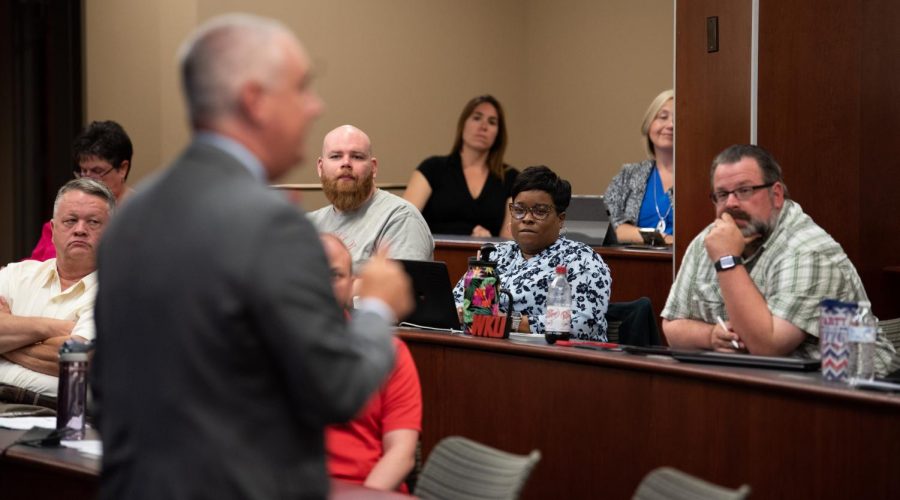Caboni addresses Staff Senate, fields questions on raises, construction
A special Board of Regents meeting to approve the budget for the 2022 fiscal year will be on Friday.
September 6, 2022
WKU President Timothy Caboni was present at Tuesday’s Staff Senate meeting to answer questions posed by its members in a roughly hour-and-a-half meeting.
“This is actually one of my favorite things to get to do to kickoff each year,” Caboni said. “Some of you may recall that in my inaugural year it was one of the first things that I did.”
Staff questions included topics like the university’s raise pool, parking, retention and construction.
“When I think about shared governance, from my perspective, this is a really important give and take, and I asked our student government association, I asked our Faculty Senate each year…tell me what you want to accomplish and let me be helpful in getting us there,” Caboni said. “I think there is a great deal of opportunity ahead. I also appreciate the feedback that I, and everyone who works for me, gets from you. It’s important for us, as an institution, to have an ongoing dialogue about how we do better.”
Caboni addressed how compensation would be given out to staff in a post-COVID world.
“Many of the questions you all have submitted electronically deal with compensation,” Caboni said. “As much as I wish we could have an 8% raise pool, to those that work on the [budget committee] we know that’s probably not doable because of, well, math. And the reality is, for us to be able to have that kind of pool would require enrollment and retention that, not just us, no one could do.”
Caboni said WKU has a 2% raise pool this year, which received a fair share of questions from the senate. Caboni said he did not have a definite strategy yet to decide who gets what raises, but he is in continued conversations with the budget committee.
Caboni said he doesn’t think everyone will get a 2% raise “across the board.”
“I think that you might have a range,” Caboni said. “I think where we’re headed as an organization…is being able to signal the internal market to reward people who are over performing, and say ‘thank you’ in a way that feels like a thank you, and for folks who are underperforming to have a difficult conversation, ‘do you want to do this work?’ And, if not, how can I help you get to a place where you’ll be successful?”
Next, Caboni addressed questions about the pandemic and what the university has learned throughout the last two virtual years.
“One of the things we’ve learned is that our students desperately need to be in person,” Caboni said. “But the other thing we have learned through the pandemic is that we, as an organization, must be flexible. Our students need us and to be candid we need one another. The work that we do requires us to be a community. It’s not just us sitting via Zoom.”
Caboni also answered a question regarding parking access and costs for staff. Compared to other universities across the Commonwealth, “we’re doing okay,” Caboni said.
“We don’t have a parking problem, necessarily, we have a walking problem,” Caboni said. “I know everybody wants to park in front of a restaurant or the door where they work, and the reality is for us to have a campus that feels the way our campus feels, that can’t be.”
Caboni then addressed questions regarding hiring and construction.
Along with moving traffic to the edges of campus, Caboni said WKU is making the top of the hill more accessible to those that are “mobility challenged” by increasing stairless paths up the hill and lowering grades.
Caboni briefly discussed the retention rates of both faculty and students. Currently, WKU’s retention rate for students is approximately 77%, a number Caboni is confident can be brought up to 80% by the end of next year.
Lastly, Caboni touched on hardships the field of higher education is facing in today’s climate.
“The world of higher education today is tough, it just is,” Caboni said. “It’s tough everywhere [but] it’s particularly challenging in our Commonwealth. If you look at the number of students going to higher education from high school it’s continuing to decline, and it should make all of us crazy because the future of our state and the future of our economy is dependent upon more people continuing their education.”
The full meeting can be viewed here.
Administration reporter Michael Crimmins can be reached at [email protected].
























